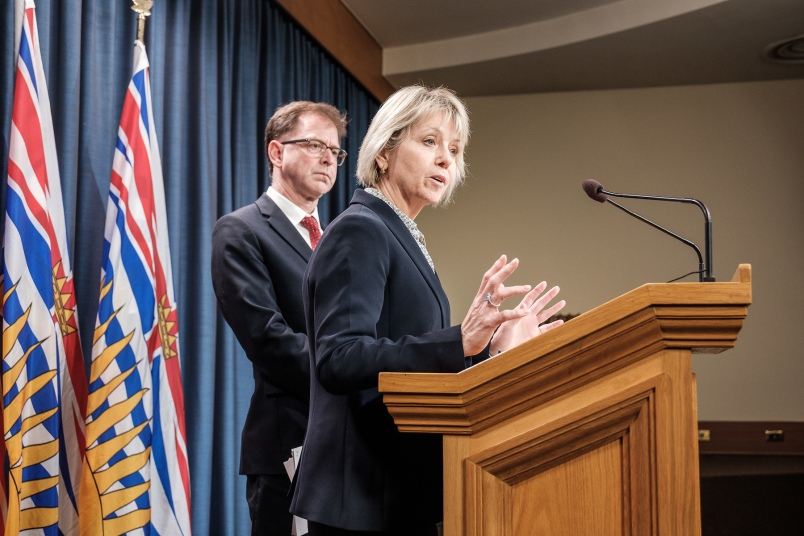Provincial Health Officer Dr. Bonnie Henry said Saturday she does not know exactly what the province's COVID-19 testing capacity is or the exact backlog of tests needed to be processed.
Henry did acknowledge capacity is in the "several thousands" and said the backlog of tests will be cleared by early next week.
On March 13 the B.C. Centre for Disease Control reported it had tested 6,326 people in B.C. Now, completed tests are up to 17,912, meaning health officials were clearing 1,655 tests per day, on average over the past week.
On Saturday Henry said there are 74 new tested cases of COVID-19.
The new positive tests reported are actually a lagging indicator of novel coronavirus infections, said Henry.
"There was a backlog and that's being worked through and that's one of the reason we see a peak in numbers this week; that's not a reflection of when people got sick it's a reflection of when the tests got reported," said Henry.
"Even if the test is not back people are being isolated, people are being put into self isolation, or if they need treatment they are being hospitalized for this; but yes I expect to have the backlog, I understand, will be completed by the end of this weekend or early next week.
"And we brought online other laboratory capacity; I don't have the numbers in front of me, but we're on the several thousands per day," said Henry.
However, on top of the reported cases an unknown number of British Columbians are likely infected. These are ones who are asymptomatic or those who are experiencing mild respiratory symptoms but who are advised to self-isolate for 14 days without being tested, based on a self-assessment tool being widely promoted by Henry and health authorities.
The pandemic is likely widespread already in B.C., underscoring the need for all households to immediately isolate and severely restrict movements in public for the coming weeks, according to Vancouver family physician and assistant clinical professor at University of B.C Dr. Linda Jando.
The medical clinic director told Glacier Media this week her clinic doctors were waiting too long for COVID-19 tests after being exposed to international travelers. Yesterday, Metro Vancouver doctors (including those employed directly by health authorities and who are ordered not to speak to media directly) penned a unified letter to Henry imploring more action since "at our current rate of spread, our hospitals will be overwhelmed within a few weeks without drastic action."
They underscored the need for "early education, transparency, social distancing and testing."
Jando said the BCCDC itself told her Tuesday it had capacity to run 900 tests but that the centre had received 4,300 tests on Monday.
The province has set up other testing centres and is now employing private laboratories. But there's little detailed information on how labs and COVID-19 centres are processing the tests.
Henry said there is a "global challenge" with getting enough testing material.
As such it's a challenge to meet the expectations required to stamp out COVID19, according to the World Health Organization, which stated on March 16: "The most effective way to prevent infections and save lives is breaking the chains of transmission. And to do that, you must test and isolate. You cannot fight a fire blindfolded. And we cannot stop this pandemic if we don't know who is infected. We have a simple message for all countries: test, test, test. Test every suspected case."
The WHO said even mild symptoms should be tested.
The federal government meanwhile is expediting new testing equipment without the usual regulatory approvals.
Evidence emerging from Italy indicates mass testing is critical to stamping out COVID-19 in communities, reports show.
"The real problem is asymptomatic positives, if we continue to send them around; the epidemic, we will never eliminate it," said Dr. Andreas Crisanti speaking to Italian TV network about the University of Padua's findings.
Cristani told the Guardian.com: "Beginning on 6 March , along with researchers at the University of Padua and the Red Cross, we tested all residents of V˜, a town of 3,000 inhabitants near Venice - including those who did not have symptoms. This allowed us to quarantine people before they showed signs of infection and stop the further spread of coronavirus. In this way, we eradicated coronavirus in under 14 days."
Henry hinted that such widespread testing could be a thing of the near future if government officials can adequately respond to testing needs.
"If and when we flatten this curve we'll be changing our testing strategy again. As we try to decrease the community transmission with all of those measures that we are doing today, including outbreak management, making sure we are protecting our seniors in long-term care homes, making sure we are detecting people in hospital, or might be in hospital and making sure everyone who has travelled outside the country is self-isolating and looking after themselves.
"Once we get to the point where we flatten the curve (of infection) enough then we need to start widely testing again to make sure we aren't getting more introductions. So that is down the road; hopefully in a matter of weeks we'll get to that point," said Henry, adding more information on testing capacity should be made public next week.




